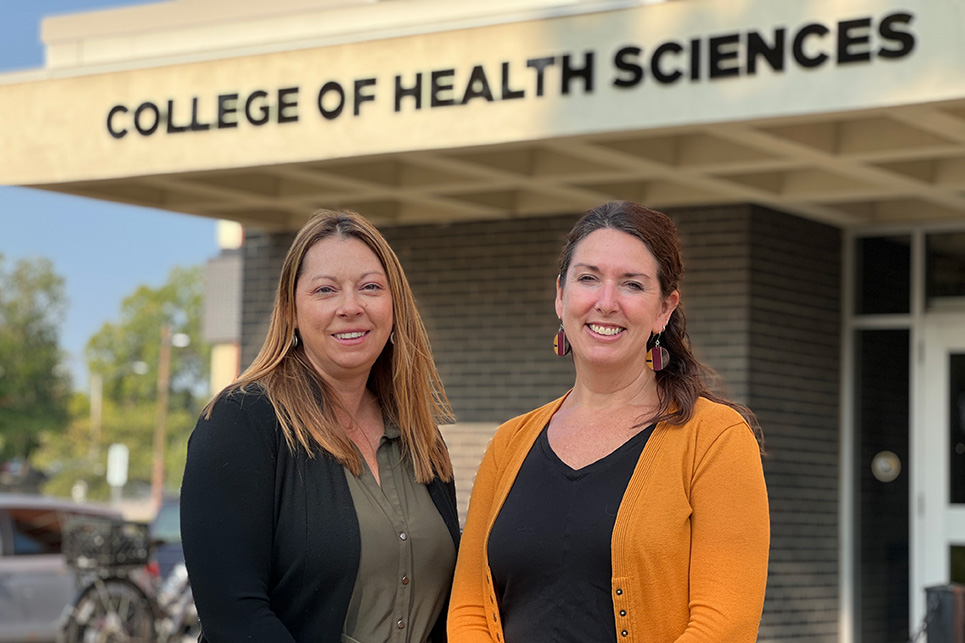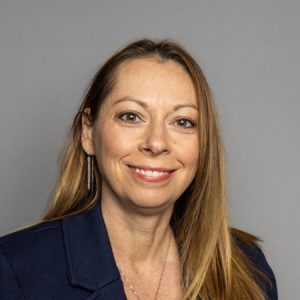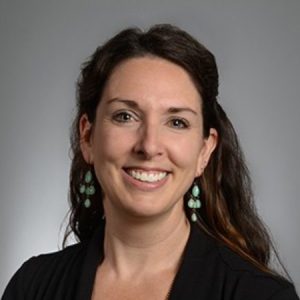Sep. 17, 2024

Story by Cheri Ghan
Depression, pain and grief over her daughter’s suicide led Dianne Cain to a mental breakdown and her own suicide attempt. Her son desperately needed help for his mother, and he found it through the Integrative Behavioral Health Clinic (IBHC).
“I had done therapy before, but it didn’t work,” Cain said. “Thirteen years later I was ready, but I had a lot of grief to process before I could separate those feelings from facts.”
Cain was matched with student clinician Emily Offenheiser, who graduated this spring with her Master of Social Work from the University of Missouri. Cain was Offenheiser’s first client. After reading Cain’s case notes before their first session, Offenheiser said she sat back to let Cain tell her story.
“She was, to use a nonclinical term, a ‘hot mess express’ at first,” Offenheiser said. “Her emotions were all over the place. She was not self-regulating. We worked out a plan that included her journaling and checking her facts versus her feelings.”
Self-regulating is the ability to respond to the ongoing demands of one’s experiences with an appropriate and socially acceptable range of emotions that allows spontaneous reactions to situations. This would be a big change for Cain, but she worked with Offenheiser to create behavioral plans, try to live them and document her actions and progress in the journal.
“I had her write down what she was feeling and what she could control,” Offenheiser said. “The goal was for her to be able to say, ‘I’ve done everything I can at this point.'”
Cain and Offenheiser worked through the layers of guilt, depression and loneliness Cain had built around herself. Cain said the hardest part was sorting out her feelings about her experiences.
“I get so emotional,” Cain said. “Exposing all those feelings was hard, but her saying ‘Let’s go through the facts’ and having me write stuff down helped.”
Offenheiser said the “aha” moment for Cain came when she could embrace her daughter and her death without shame.
“Integrating her back into her life in a healthy way, even sitting on the back porch to talk to her, was huge,” Offenheiser said. “But when Dianne’s sessions started to be more about a dress she wanted or going to the grocery store, and she was doing everything we practiced, I knew she was ready to be done with therapy.”
This is just one of countless success stories to come out of the IBHC, a clinic created by Mizzou School of Social Work faculty members and staffed by student clinicians. The clinic is co-directed by Social Work faculty members Kelli Canada, associate professor and associate director of research, and Danielle Easter, assistant clinical professor. The IBHC is celebrating its 10th anniversary this month.
Easter said Offenheiser’s experiences helping Cain set her up perfectly for practice after graduation — exactly what she wants to see for all students to work there.
“It prepares students for clinical work by giving them opportunities to take what they are learning in the classroom and immediately apply it in their work at the clinic,” Easter said. “It gives me hope for the future and so much satisfaction to see where their journeys take them.”
Meeting the moment
The IBHC is nestled in the Family Impact Center, a relatively nondescript brick building near downtown Columbia. The student-facilitated clinic is open one day every week, providing clinical mental health services to about 50 clients during its average day of operation. To date, the clinic has served more than 600 clients who might otherwise have slipped through the cracks.
A decade ago, students working in the MedZou Community Health Clinic observed a growing number of patients exhibiting anxiety and depressive symptoms. MedZou leadership reached out to the School of Social Work to see if they could work together to meet this need, and the resulting collaboration led to the launch of the IBHC in September 2014.
Today, the IBHC collaborates with clinics like MedZou, PhysZou and TigerOT to provide care to uninsured and underinsured residents of Central Missouri.
“There were people in the community who didn’t have access to such services due to not having health insurance or who were facing other barriers such as wait times, high deductibles or limits on allowable sessions,” Easter said. “The clinic was created to fill a gap in access to clinical mental health services.”
It’s a mutually beneficial relationship: Master of Social Work and counseling psychology students gain valuable experience working with clients, and the clients receive the help they need to function successfully. Both parties describe the experience as life-changing. The clinic sees patients 17 years old or older, and a referral is not required.
Easter handles day-to-day clinic operations, supervises the student clinicians and directs clinical instruction. Canada oversees the research, financial oversight and outcome data management to measure the impact of their work, which is required by the ethical standards of clinical social workers.
“We integrate ways for students to use data with their clients in session as a tool to monitor progress toward goals and changes in symptoms,” Canada said. “We build new knowledge through our experiences with students, reviewing the program evaluation data, and determining the impact of new quality improvement initiatives. Our students bring expertise in so many areas. They’ve shaped our assessment approaches, services offered and physical space.”
Though not a graduation requirement, students can participate in the IBHC as a practicum placement or an elective course during their master’s program. Easter said they gain expertise in carrying a caseload, providing therapeutic assessment, treatment planning and interventions.
“It prepares students for clinical work by giving them the opportunity to take what they are learning in the classroom and immediately apply it in their work at the clinic,” Easter said. “They leave the experience more confident and prepared to provide services in their practicum placements and upon graduation. Community employers have reached out with their appreciation of that training.”
Strengthening relationships
After nine years of working solely with individual clients, the IBHC filled another gap in mid-Missouri by offering couples counseling. The first master’s student to work with one of the couples was Sarah Howell, a spring 2024 MSW graduate. Howell said those experiences at the IBHC affirmed her interest in working with couples to improve their relationship with each other.
“As a firm believer in attachment science, it has been an honor to walk alongside my clients, supporting them as a surrogate attachment figure in their life journey,” Howell said. “Witnessing their progress and knowing I supported them in their hard work toward improved mental health is extremely rewarding.”
Looking ahead to the next decade of healing mid-Missourians through the IBHC, Canada said they hope to continue to grow the couples therapy program.
“We’re always excited to try and meet the needs of the community,” she said. “Couples therapy is expensive and not accessible by many moderate to low-income families. Considering most of our students don’t get extensive training on couples work, offering it through the clinic meets two goals of training students and providing access to care.”
While the obvious benefit of the clinic is to the social work students and the clients they serve, the faculty members who oversee the operation see a positive impact on their own lives as well.
“It is fulfilling in more ways than I can describe,” Easter said. “It has renewed my passion for the work that social workers provide to marginalized and underserved populations.”

